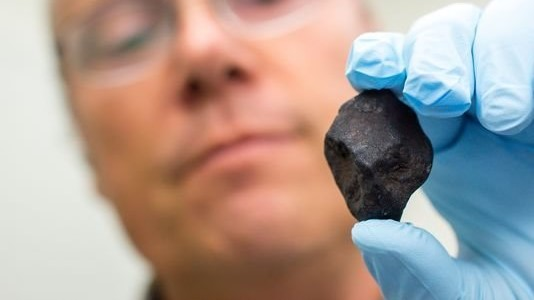A meteor that thundered brightly Tuesday night over southeast Michigan probably scattered precious space rocks across the area. And if they land on your property, they're yours to keep.
The fireball that arrived at roughly 8:15 p.m. is estimated to have been a meteor about 2 yards in diameter. But after traveling through the atmosphere, it would have likely broken into fairly small rocks of a couple ounces or so, said Bill Cooke, lead for NASA's Meteoroid Environment Office in Huntsville, Ala. "You're not going to find a big boulder."
Examine the rock
Meteorites are safe to touch, radioactivity isn't a big concern, and they cool off on their way down.
"You can pick up a meteorite right after it lands," Cooke said. "Meteorites are not smoking hunks of rock."
They may look like Earth's rocks, but with signs of burning.
"They might look like charcoal," Cooke said, adding that a smooth surface and "black fusion crust" is common for a meteorite. "It feels heavier than it should. It can be magnetic."
Meteorites generally don't have holes.
The Meteoritical Society website reports that they could be stone-like or metallic, "in which case they are much heavier and ring like a bell when struck with a metallic object."
The Washington University in St. Louis website offers a Self-Test Checklist to help.
Have it tested
If you think you've got one, have it tested.
It could be helpful to ask experts at a local museum or university. Positive identification can be tricky, but experts are available to confirm if you send a small sample.
A list of testing centers is available on Meteorite-Identification.com.
Melanie Casselman found this rock in her backyard and thought it could be a meteorite and Clemson University researchers have visually confirmed that she is right. (Photo: Contributed)
Make sure you can keep it
So long as the meteorite fell on your property, it's yours, Cooke said.
If it's on public land, the laws are different: Meteorites on national parks belong to the federal government, but on other types of public land, the laws can be ambiguous, according to a report on LiveScience.com.
Meteorites are quite valuable, worth as much as $1,000 per gram, according to the LiveScience website. Kellyco Metal Detectors posted on eBay that it can sell for $300 per gram or more — meaning 1 pound could be worth $1 million.
"Meteorites are rarer than gold, platinum, diamonds or emeralds. Owning one is the only way to touch the cosmos, and the demand for such an experience is quite high all over the world!" according to the post.
►Make it easy to keep up to date with more stories like this. Download the WZZM 13 app now.
Contact Robert Allen on Twitter @rallenMI or rallen@freepress.com.


